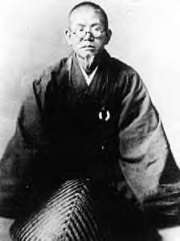|
Biografie Taneda Santôka
Taneda Santōka, birth name: Taneda Shōichi; 3 December 1882 - 11 October 1940) was the pen-name of a Japanese author and haiku poet. He is known for his free verse haiku.
Santoka, an ordained Zen priest, after spending most of his life wandering all over the country as a begging monk, chose to settle in Matsuyama only to die 10 months later. The humble cottage where he dwelt -- Isso-an (A Blade of Grass Hermitage) is preserved north of Ehime University. His books and documents are also preserved in Shiki Memorial Museum.
"In February of 1929 I received ordination as a monk and became resident priest at Mitori Kannon-do in the countryside of Kumamoto Prefecture. It was truly a solitary forest life (sanrin dokuju); as for quietness it was quiet, as for loneliness it was lonely -- such a life it was." (Taneda Santoka - from "Sômokutô") The Zen he was ultimately to practice, however, though traditional, was unusual. It was the Zen of solitary walking. The open road was to become his home and his monastery.
Santoka is said to have walked more than twenty-eight thousand miles, starting out each morning penniless and with no food, and not knowing where he would stay or even if he would find lodging for the night. These were very hard miles, miles which brought sun and rain, generosity and hostility, food and hunger, smiles and scowls, health and illness, thirst and pure water, loneliness and moments of companionship, grief and intense happiness, but moments always lived with the thought that everything should be welcomed, whether good or bad, just as he himself was not judged but welcomed and taken in by the kindly Gian (the head priest).
The record of his various thoughts, feelings, perceptions, and of the myriad sights and sounds he encountered on his walks of self-discovery, will be found in his poems. The poems are characterized by an absolute simplicity, an absolute honesty, a total absence of artifice. In a world such as ours, brimming over as it is with lies, disinformation, propaganda, and the totally phony, Santoka's spontaneous utterances come to us like a pure, cool, and refreshing breath of air.
|





